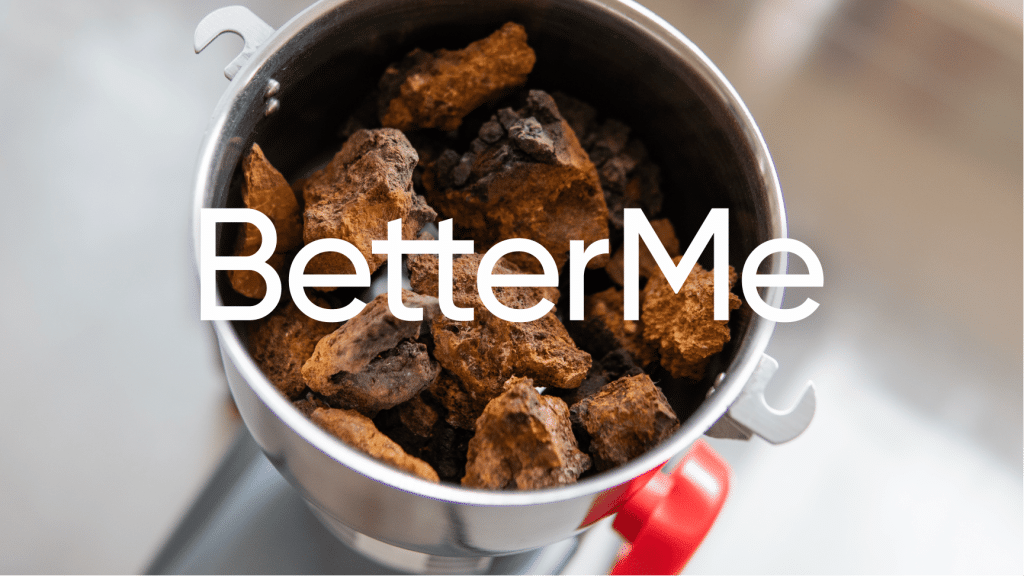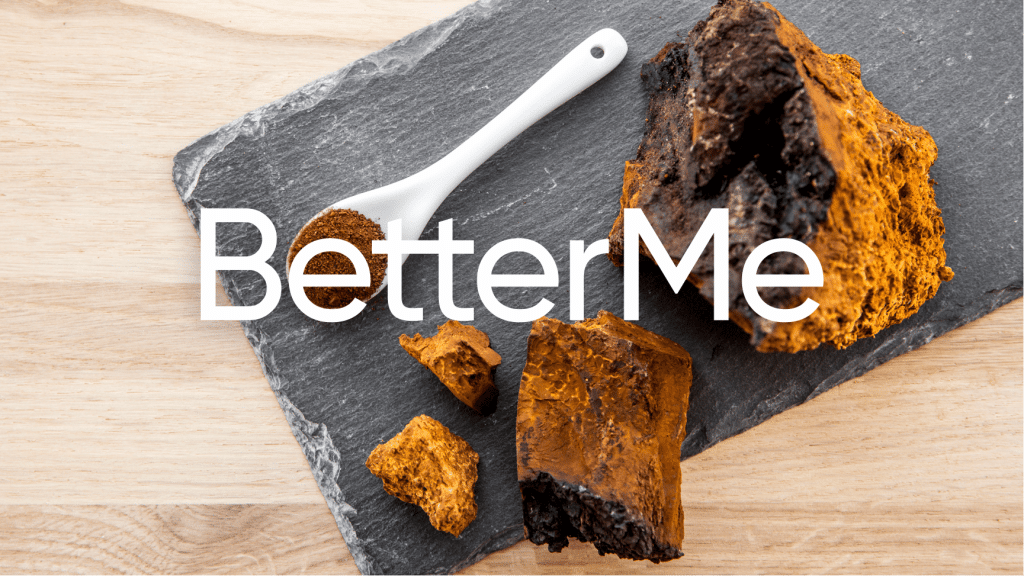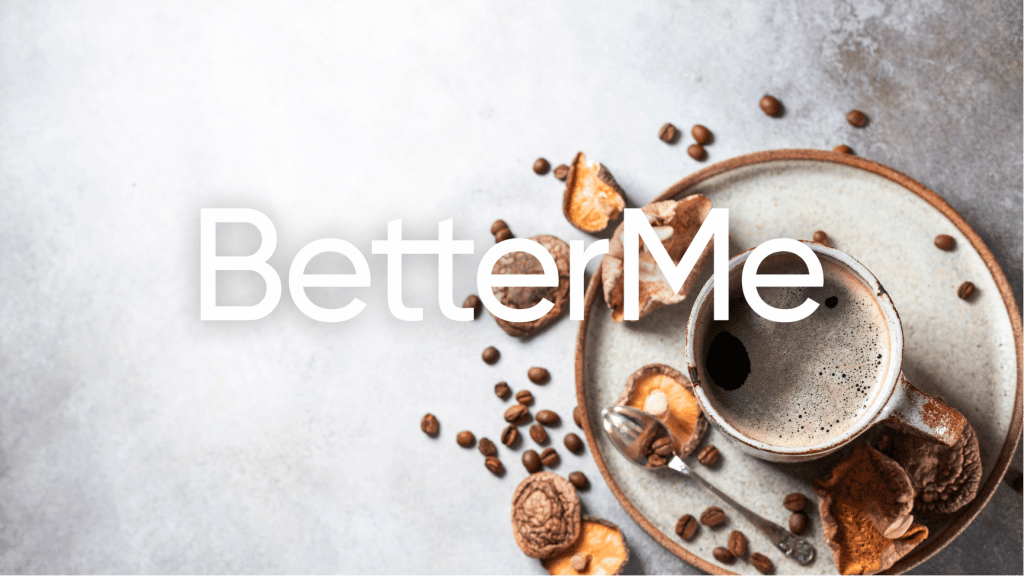Health and wellness trends come and go, but it seems like one trend is here to stay: drinking coffee for health benefits. Now there’s a new type of coffee on the market that promises even more health benefits than your typical cup of joe: mushroom coffee. Mushroom coffee is made by combining coffee beans with any powdered mushroom like reishi, cordyceps, or chaga. While it might sound strange, the combination is said to offer a host of benefits, including improved energy levels, reduced inflammation, and enhanced cognitive function (7). That said, what are the potential benefits of drinking mushroom coffee? Let’s take a look.
Get your personalized
meal plan!
What Is Mushroom Coffee?
Mushroom coffee is a delicate balance of coffee and mushrooms. It is a type of functional coffee that is thought to provide benefits beyond the traditional cup of joe. The two main types of mushrooms used in these coffees are Lion’s Mane and Chaga.
Lion’s mane is an edible mushroom that has been used in Chinese medicine for centuries. This type of mushroom is known for its possible cognitive-enhancing properties (9).
Chaga is a type of mushroom that grows on birch trees in cold climates. It is a superfood that is rich in antioxidants and has anti-inflammatory properties (3).
Other medicinal mushrooms used to make the coffee blend include:
- Turkey’s tail – said to boost the immune system
- Cordyceps – believed to increase energy levels
- Reishi – may reduce stress and promote sleep
What Are The Benefits Of Mushroom Coffee?
Mushroom coffee is a fairly new concept, so there is limited research on its potential health benefits. However, the individual mushrooms that are used in these coffees have been studied more extensively, but the research is still in its early stages and mostly based on results from test tube studies.
Here are some of the potential health benefits associated with consuming mushroom coffee:
Reducing Inflammation
Inflammation is a healthy, normal immune response. However, when inflammation becomes chronic, it is associated with a variety of health problems, including heart disease, arthritis, and diabetes.
Mushroom coffee may help to reduce inflammation thanks to the anti-inflammatory properties of mushrooms like chaga and cordyceps. Chaga mushrooms contain compounds called glucans, which may help reduce inflammation (3).
Cordyceps mushrooms also have anti-inflammatory effects and may help to reduce the risk of chronic diseases like heart disease (2).
Read More: Can You Eat Coffee Beans? Yes, But With Caution
Improving Energy Levels
If you’re looking for a natural way to boost your energy levels, mushroom coffee may be worth a try. The coffee beans in the drink provide caffeine, while the mushrooms contain compounds that might help to increase energy levels.
Cordyceps mushrooms, for example, contain a compound called adenosine that is believed to help increase energy levels. Reishi mushrooms are also said to have energizing effects and may help to improve stamina (4).
Enhancing Cognitive Function
Mushroom coffee may also help to enhance cognitive function. The lion’s mane in the coffee may have neurotrophic effects, meaning that it could support the growth, survival, and differentiation of nerve cells (9).
Cordyceps mushrooms might also help to improve cognitive function by reducing inflammation and boosting energy levels.
Relaxing Sore Muscles
Muscle soreness can be caused by inflammation, overuse, or injury. Mushroom coffee may help reduce muscle soreness thanks to the anti-inflammatory effects of mushrooms like chaga and cordyceps.
Cordyceps and chaga mushrooms may both have anti-inflammatory effects that may help reduce muscle soreness (4).
Boosting Immunity
Your body’s immune response is what helps you to fight off infections and illnesses. Mushrooms like chaga and turkey tail mushrooms are known for their immune-modulating effects (6).
Chaga mushrooms are rich in antioxidants which help support immunity. Turkey tail mushrooms also contain a compound called polysaccharide-K that may help stimulate the immune system (6).
May Help Prevent Cancer
Lion’s mane, Reishi, Chaga, and Cordyceps have potential as supportive therapies for cancer patients as they are thought to help to improve quality of life by reducing fatigue, pain, anxiety, and depression. Some of these mushrooms might also have immunomodulatory and anti-tumor effects.
Mushrooms like chaga and cordyceps contain compounds that may help boost immunity and fight off infections. Lion’s mane mushrooms contain compounds that may help kill cancer cells or reduce tumor size (10).
Reishi mushrooms may also have anti-cancer effects and contain compounds that might help inhibit the growth of cancer cells (10).
BetterMe app will provide you with a host of fat-frying fitness routines that’ll scare the extra pounds away and turn your body into a masterpiece! Get your life moving in the right direction with BetterMe!
May Help Prevent Heart Disease
Heart disease is the leading cause of death worldwide. Mushrooms like reishi and cordyceps are said to help to reduce the risk of heart disease.
One study found that reishi mushrooms may help to improve HDL cholesterol and triglyceride levels, but others have found no benefit. Animal and test tube studies have also suggested that cordyceps mushrooms may be beneficial for the cardiovascular system, but human studies are needed to verify this (2).
May Help Improve Gut Health
Mushrooms like chaga and reishi may help to improve gut health by restoring balance in the gut microbiome (1).
Mushrooms contain prebiotic fiber which supports the growth of beneficial bacteria. Some of these mushrooms also have anti-inflammatory effects which might help reduce inflammation in the digestive system (1).
Mushroom Coffee Side Effects
Human studies on the side effects of mushroom coffee are limited. This poses a risk for potential side effects that are not yet known.
People taking medications, pregnant women, and people with medical conditions should consult a doctor before drinking mushroom coffee.
The most common downside of drinking mushroom coffee is its high price point. Because medicinal mushrooms are not yet mainstream, they can be expensive.
Mushroom coffee is also not as widely available as regular coffee. However, it is possible to find mushroom coffee online and in some health food stores.
Read More: Bulletproof Coffee Fasting: Should You Say No To Keto Coffee When You’re On A Fast
Frequently Asked Questions
Despite limited research, mushroom coffee is becoming increasingly popular. This section will answer some of the most common questions about mushroom coffee.
Is Mushroom Coffee Safe?
There is limited research on the safety of mushroom coffee. However, it is generally considered safe to drink in moderation (7). People taking medications, pregnant women, and people with medical conditions should consult a doctor before drinking mushroom coffee.
Is Mushroom Coffee Good For You?
Mushroom coffee is a source of antioxidants and fiber and contains compounds that may boost immunity, fight cancer, and improve heart health (6). However, more research is needed to confirm these potential health benefits.
Is Mushroom Coffee Healthier Than Regular Coffee?
Mushroom coffee might be considered healthier than regular coffee, depending on your perspective, as it contains less caffeine and more nutrients (7). However, more research is needed to confirm the potential benefits of mushroom coffee.
What Does Mushroom Coffee Taste Like?
Mushroom coffee typically tastes earthy and slightly bitter. It doesn’t taste too different from regular coffee, but the bitterness is more pronounced.
Betterme will keep you laser-focused on your weight loss journey! Nutrient-packed meal plans, fat-blasting workouts, galvanizing challenges and much more. Try using the app and see for yourself!
Does Mushroom Coffee Help You Lose Weight?
There is no evidence to suggest that mushroom coffee helps with weight loss. However, as it is a low-calorie beverage, it may help to reduce calorie intake if substituted for high-calorie drinks like sugary coffee beverages (7).
Is Mushroom Coffee Addictive?
Mushroom coffee is not addictive and does not contain any psychoactive compounds other than caffeine. However, like regular coffee, it does contain caffeine, which can be addictive for some people.
Should You Drink Mushroom Coffee?
Mushroom coffee is a source of antioxidants and contains compounds that may boost immunity, fight cancer (6), and improve heart health. However, more research is needed to confirm these potential health benefits.
If you decide to drink mushroom coffee, be sure to do so in moderation. People taking medications, pregnant women, and people with medical conditions should consult a doctor before drinking mushroom coffee.
DISCLAIMER:
This article is intended for general informational purposes only and does not serve to address individual circumstances. It is not a substitute for professional advice or help and should not be relied on for making any kind of decision-making. Any action taken as a direct or indirect result of the information in this article is entirely at your own risk and is your sole responsibility.
BetterMe, its content staff, and its medical advisors accept no responsibility for inaccuracies, errors, misstatements, inconsistencies, or omissions and specifically disclaim any liability, loss or risk, personal, professional or otherwise, which may be incurred as a consequence, directly or indirectly, of the use and/or application of any content.
You should always seek the advice of your physician or other qualified health provider with any questions you may have regarding a medical condition or your specific situation. Never disregard professional medical advice or delay seeking it because of BetterMe content. If you suspect or think you may have a medical emergency, call your doctor.
SOURCES:
- A Critical Review on Health Promoting Benefits of Edible Mushrooms through Gut Microbiota (2017, nih.gov)
- Cordyceps militaris: An Overview of Its Chemical Constituents in Relation to Biological Activity (2021, nih.gov)
- Chaga Mushroom Health Benefits (2022, clevelandclinic.org)
- Functional Cordyceps Coffee Containing Cordycepin and β-Glucan (2020, nih.gov)
- Ganoderma lucidum (Lingzhi or Reishi) (2011, nih.gov)
- Immune Modulation From Five Major Mushrooms: Application to Integrative Oncology (2014, nih.gov)
- Mushroom Coffee: Should You Be Drinking It? (2020, clevelandclinic.org)
- Neuronal Health – Can Culinary and Medicinal Mushrooms Help? (2013, nih.gov)
- Neurotrophic properties of the Lion’s mane medicinal mushroom, Hericium erinaceus (Higher Basidiomycetes) from Malaysia (2013, nih.gov)
- Recent developments in mushrooms as anti-cancer therapeutics: a review (2012, nih.gov)














